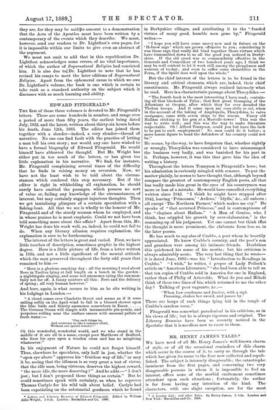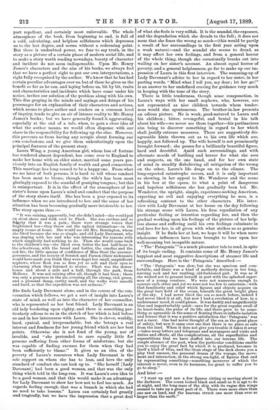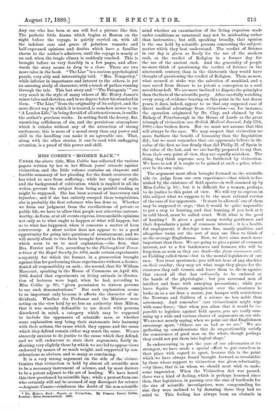MR. HENRY JAMES'S TALES.*
WE have need of all Mr. Henry James's well-known charm of style, or of all the occasional reminders of this charm which occur in the course of it, to carry us through the tale which has given its name to the four now collected and repub- lished. The subject is intensely disagreeable; the catastrophe imminent from the first pages, and concerning two very disagreeable persons in whom it is impossible to feel an interest, offers none of the morbid excitement sometimes attendant upon such situations ; fortunately, the author is far from having any intention of the kind. The characters, with one slight exception, are for the most • A London Life ; and other Tales. By Henry James. 2 vole. London and New York : Macmillan and Co. 1889. part repellent, and certainly most unloveable. The whole atmosphere of the book, from beginning to end, is full of a cold, calculating, and helpless selfishness which depresses us to the last degree, and seems without a redeeming point. But there is undoubted power, we fear to say truth, in the story as a picture of a certain phase of modern social life, and to make a story worth reading nowadays, beauty of character and incident do not seem indispensable. Upon Mr. Henry James's characters and the aim of his books, we always feel that we have a perfect right to put our own interpretations, a right fully recognised by the author. We know that he has had certain peculiar advantages over us, but of these he gives us the benefit as far as he can, and laying before us, bit by bit, traits and characteristics and incidents which have come under his notice, invites our solution of the problem along with his own. This dim groping in the minds and sayings and doings of his personages for an explanation of their characters and actions, which seems to place author and readers on a common level of inquiry, tends to give an air of intense reality to Mr. Henry James's books ; but we have generally found it aggravating, especially at the end of a tale, when, to gain a clear idea of what the author means, we would often dispense with our share in the responsibility for following up the clue. However, this prevents us from having any scruple about forming our own conclusions, and we give them unhesitatingly upon the principal features of the present story.
Laura Wing, a young American girl, whom loss of fortune has rendered almost dependent, has come over to England to make her home with an elder sister, married some years pre- viously into an English family of wealth and good connection.
This marriage has long ceased to be a happy one. From what we see later of both persons, it is hard to tell whose conduct has been most to blame, though the wife's has been most glaringly exposed to the scandal of gossiping tongues ; but this is unimportant. It is in the effect of the atmosphere of her sister's house upon Laura's mind and conduct that the purpose of the story shows itself. She has been a year exposed to its influence when we are introduced to her, and the sense of her situation has been becoming gradually more intolerable to her. The story opens thus :— " It was raining, apparently, but she didn't mind—she would put on stout shoes and walk over to Plash. She was restless and so fidgety that it was a pain ; there were strange voices that frightened her—they threw out the ugliest intimations—in the empty rooms at home. She would see old Mrs. Berrington, whom she liked because she was so simple, and old Lady Davenant, who was staying with her and who was interesting for reasons with which simplicity had nothing to do. Then she would come back to the children's tea—she liked even better the last half-hour in the schoolroom, with the bread and butter, the candles and the red fire, the little spasms of confidence of Miss Steet the nursery- governess, and the society of Scratch and Parson (their nicknames would have made you think they were dogs) her small, magnificent nephews, whose flesh was so firm yet so soft and their eyes so charming when they listened to stories. Plash was the dower- house and about a mile and a half, through the park, from Mellows. It was not raining after all, though it had been ; there was only a grayness in the air, covering all the strong, rich green, and a pleasant damp, earthy smell, and the walks were smooth and hard, so that the expedition was not arduous."
She finds Lady Davenant alone, and in the course of the con- versation which follows, we get a sort of insight into Laura's state of mind, as well as into the character of her counsellor, who is represented as her best friend. Lady Davenant is an old lady bordering upon eighty, and there is something par- ticularly odious to us in the sketch of her which is laid before us and in her intercourse with Laura. She is clever, worldly, hard, cynical, and irreproachable, but she betrays a real interest and fondness for her young friend which are her best points. Otherwise she is not fond of the young, nor of invalids, and " she pretended to care equally little for persons suffering from other forms of misfortune, but she was capable of finding excuses for them when they had been sufficiently to blame." It gives us an idea of the poverty of Laura's resources when Lady Davenant is the sole support on whom she has to lean, and hers the only standard of conduct she can look up to. " She herself [Lady Davenant] had been a good woman, and that was the only thing which told in the long-run. It was Laura's own idea to be a good woman, and that this would make it an advantage for Lady Davenant to show her how not to feel too much. As regards feeling enough, that was a branch in which she had no need to take lessons." Laura can certainly feel greatly and tragically, but we have the impression that a great deal of what she feels is very selfish. It is the scandal, the exposure, and the degradation which she dreads to the full ; it does not seem that she fears the wrong so much—(this would be partly a result of her surroundings in the first year acting upon a weak nature)—and the scandal she seems to dread, as it may affect her own feelings, and from a general horror of the whole thing, though she occasionally breaks out into wailing on her sister's account. An almost equal horror of poverty, and a general helplessness, go far to make up our im- pression of Laura in this first interview. The summing-up of Lady Davenant's advice to her in regard to her sister, in her parting words, "Mind what I tell you, my dear; let her go !"
is an answer to her undefined craving for guidance very much in keeping with the tone of the story.
There is little tenderness, though some compunction, in Laura's ways with her small nephews, who, however, are not represented as nice children towards whom tender- ness would rise spontaneous. The brother-in-law presents an odious picture. He is weak, good-natured to Laura and his. children ; bitter, revengeful, and brutal in his talk about his wife—we never see them together—his pertinacious aim being to discover something in regard to her which shall justify extreme measures. There are suggestively dis- agreeable hints thrown out as to his own life which are, happily, not followed up. The wife herself is not prominently brought forward ; she passes for a brilliantly beautiful figure, hard and deceitful. Amid such surroundings, and with alternate moods of loathing and horror for what she sees and suspects, on the one hand, and for her own state of mind in steadily disbelieving all mitigation of the wrong on the other, Laura's life drags on to the climax. The long-expected catastrophe occurs, and it is only important as showing, in her appeal to Mr. Wendover and the scene in his box at the opera, to what a point of dangerous and hopeless selfishness she has gradually been led. Mr.
Wendover, the upright, simple, experience-seeking American, expecting no evil and enjoying everything he sees, is a refreshing contrast to the other characters. His inter- view with Lady Davenant at her house on the day following his strange scene with Laura, his firm' repudiation of any particular feeling or intention regarding her, and then the gradual working upon his feelings of the picture of her help- less shame and suffering until his own feelings culminate in real love for her, is all given with what strikes us as genuine insight. If he finds her at last, we hope it will be when more wholesome influences have been brought to bear upon her well-meaning but incapable nature.
" The Patagonia '" is a much pleasanter tale to read, in spite of its tragic ending. It contains some of Mr. Henry James's happiest and most suggestive descriptions of steamer life and surroundings. Here is the Patagonia' described :- " The Patagonia' was slow, but she was spacious and com- fortable, and there was a kind of motherly decency in her long, nursing rock and her rustling, old-fashioned gait. It was as if she wished not to present herself in port with the splashed eager- ness of a young creature. We were not numerous enough to squeeze each other and yet we were not too few to entertain—with that familiarity and relief which figures and objects acquire on the great bare field of the ocean, beneath the great bright glass of the sky. I had never liked the sea so much before, indeed I had never liked it at all; but now I had a revelation of how, in a midsummer mood, it could please. It was darkly and magnificently blue and imperturbably quiet—save for the great regular swell of its heart-beats, the pulse of its life, and there grew to be some- thing so agreeable in the sense of floating there in infinite isolation and leisure that it was a positive satisfaction the 'Patagonia' was not a racer. One had never thought of the sea as the great place of safety, but now it came over one that there is no place so safe • from the land. When it does not give you trouble it takes it away —takes away letters and telegrams and newspapers and visits and duties and efforts, all the complications, all the superfluities and superstitions that we have stuffed into our terrene life. The simple absence of the post, when the particular conditions enable you to enjoy the great fact by which it is produced, becomes in itself a kind of bliss, and the clean stage of the deck shows you a play that amuses, the personal drama of the voyage, the move- ment and interaction, in the strong sea-light, of figures that end by representing something—something moreover of which the interest is never, even in its keenness, too great to suffer you to go to sleep."
And later:— "I went up and saw a few figures sitting or moving about in the darkness. The ocean looked black and small as it is apt to do at night, and the long mass of the ship with its vague dim wings seemed to take up a great part of it. There were more stars than one saw on land, and the heavens struck one more than ever as larger than the earth."
Any one who has been at sea will feel a picture like this. The pathetic little drama which begins at Boston on the night before the voyage, is quietly carried on, with all the indolent ease and grace of pointless remarks and half-expressed opinions and doubts which have a familiar charm to the author's admirers, until the voyage is nearly at an end, when the tragic climax is suddenly reached. This is brought before us very forcibly in a few pages, and after- wards the story seems to drop to a close. There are two more tales in the book. " The Liar " is a curious psychological puzzle, very ably and interestingly told. "Mrs. Temperley," while inferior in importance and interest to the others, is yet an amusing study of character, with a touch of pathos running through the tale. This last story and " The Patagonia " are very much in the style of many others of Mr. Henry James's minor tales and sketches, and in no degree below his standard in them. " The Liar," from the originality of its subject, and the more direct way in which it is treated, is somehow newer to us. "A London Life," in being devoid of all attractiveness, is unlike the author's previous works. In setting forth the dreary, flat, nnenticing selfishness of sin, and the pernicious atmosphere which it exhales without any of the attraction of strong excitement, this is more of a moral story than any power and skill in the handling can make it an agreeable one. That, along with the other stories, it can be read with unflagging attention, is a proof of this power and skill.




































 Previous page
Previous page